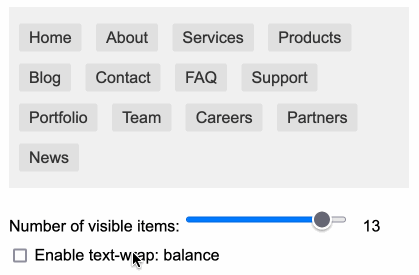Sunday, 20th October 2024
You can use text-wrap: balance; on icons. Neat CSS experiment from Terence Eden: the new text-wrap: balance CSS property is intended to help make text like headlines display without ugly wrapped single orphan words, but Terence points out it can be used for icons too:
![]()
This inspired me to investigate if the same technique could work for text based navigation elements. I used Claude to build this interactive prototype of a navigation bar that uses text-wrap: balance against a list of display: inline menu list items. It seems to work well!

My first attempt used display: inline-block which worked in Safari but failed in Firefox.
Notable limitation from that MDN article:
Because counting characters and balancing them across multiple lines is computationally expensive, this value is only supported for blocks of text spanning a limited number of lines (six or less for Chromium and ten or less for Firefox)
So it's fine for these navigation concepts but isn't something you can use for body text.
It feels like we’re at a bit of an inflection point for the Django community. [...] One of the places someone could have the most impact is by serving on the DSF Board. Like the community at large, the DSF is at a transition point: we’re outgrowing the “small nonprofit” status, and have the opportunity to really expand our ambition and reach. In all likelihood, the decisions the Board makes over the next year or two will define our direction and strategy for the next decade.
Who called it “intellectual property problems around the acquisition of training data for Large Language Models” and not Grand Theft Autocomplete?
— Jens Ohlig, on March 8th 2024
The 3 AI Use Cases: Gods, Interns, and Cogs. Drew Breunig introduces an interesting new framework for categorizing use cases of modern AI:
- Gods refers to the autonomous, human replacement applications - I see that as AGI stuff that's still effectively science fiction.
- Interns are supervised copilots. This is how I get most of the value out of LLMs at the moment, delegating tasks to them that I can then review, such as AI-assisted programming.
- Cogs are the smaller, more reliable components that you can build pipelines and automations on top of without needing to review everything they do - think Whisper for transcriptions or maybe some limited LLM subtasks such as structured data extraction.
Drew also considers Toys as a subcategory of Interns: things like image generators, “defined by their usage by non-experts. Toys have a high tolerance for errors because they’re not being relied on for much beyond entertainment.”
I really dislike the practice of replacing passwords with email “magic links”. Autofilling a password from my keychain happens instantly; getting a magic link from email can take minutes sometimes, and even in the fastest case, it’s nowhere near instantaneous. Replacing something very fast — password autofill — with something slower is just a terrible idea.
Knowledge Worker (via) Forrest Brazeal:
Last month, I performed a 30-minute show called "Knowledge Worker" for the incredible audience at Gene Kim's ETLS in Las Vegas.
The show included 7 songs about the past, present, and future of "knowledge work" - or, more specifically, how it's affecting us, the humans between keyboard and chair. I poured everything I've been thinking and feeling about AI for the last 2+ years into this show, and I feel a great sense of peace at having said what I meant to say.
Videos of all seven songs are included in the post, with accompanying liner notes. AGI (Artificial God Incarnate) is a banger, and What’s Left for Me? (The AI Existential Crisis Song) captures something I've been trying to think through for a while.